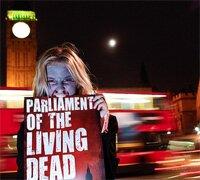A weak Prime Minister is good news
For those of us who believe that the current economic climate is exactly the worst time to consider raising the taxes of those on meagre incomes, yesterday’s u-turn compromise by the Chancellor is a victory of sorts.
There were no certainties or specifics, and suspicion surely remains that this ‘compensation package’ will be aimed at the more politically-appealing pensioners and families rather than any single people and under-25s who’ll lose out.
Nonetheless, the Government finally heeded the howls of its own backbenchers, showed some contrition and came up with something that allows everyone to retreat from this fortnight-long fight, no matter how bruising the encounter has been.
But as Gordon Brown retreats to his residence to lick his wounds, add Frank Field to his shit list and suffer the Tory taunts about his leadership repeated endlessly on the nightly news, you could hardly blame him for wistfully reminiscing of those days in ‘97 and ‘01 when Labour boasted such a battering-ram of a majority that it could force almost any policy, no matter how unpopular and disastrous, through Parliament with votes to spare. The rest of us, however, may be tempted to draw the exact opposite conclusion.
If Brown’s government had enjoyed the same size majority as when Labour first came to power, Brown’s last budget would’ve endured but a fraction of the commotion we’ve seen this past week, and it’s doubtful that the backbenchers’ concerns would’ve been listened-to and addressed. Equally, if we changed our electoral system, Parliament would not be able to function without greater compromise and cross-party consensus and scrapping the 10p rate in the way Brown and Darling proposed might never have gotten this far.
I’ve written in the past on my blog on the kinds of benefits that could be brought to our democracy by implementing some form of Proportional Representation. Aside from its biggest attraction as a system of voting that more accurately reflects the number of votes each party receives, I’ve argued that it has the potential to increase voting turn-out by making people in traditionally safe Labour/Conservative seats know that not only will their votes be counted, but their votes will count.
Furthermore, I’ve suggested that by wrenching the major parties’ focus away from the fawned-over marginals of middle England, Labour has a chance to reconnect with a working class heartlands it has stopped knowing how to talk to, and in the process perhaps develop a greater knowledge and understanding that would be useful when devising policy.
With the 10p tax revolt we now see a third advantage of PR in the potential it has to reinvigourate our Parliamentary process. Ruling coalitions would only enjoy slender majorities but the rest of us would enjoy greater democracy. Ministers would be forced to consult on legislation, Commons committees would have greater influence as policy scrutinisers and compromise and consensus would be far more prevalent in Parliament than we ever see today. Most appealingly for Gordon, this crisis might never have happened. Surely that reason alone is enough to give it some serious thought…
-------------------------
| Tweet |
Neil Robertson is a regular contributor to Liberal Conspiracy. He was born in Barnsley in 1984, and through a mixture of good luck and circumstance he ended up passing through Cambridge, Sheffield and Coventry before finally landing in London, where he works in education. His writing often focuses on social policy or international relations, because that's what all the Cool Kids write about. He mostly blogs at: The Bleeding Heart Show.
· Other posts by Neil Robertson
Filed under
Blog ,Economy ,Labour party ,Our democracy ,Westminster
13 responses in total ||
If you’re going to put constitutional reform on the table as a topic of discussion, why not offer some original thinking instead of parroting established criticisms.
Because if you really wanted to keep politicians and voters on their toes you’d constantly fiddle with the electoral systems in place and mess with boundaries on an annual basis – oh, but look, that’s what we do have and that’s how we got where we are.
At some point you’ve got to accept to work within the system so that you can get on with using it to your advantage, rather than continually fighting battles that cannot be won.
I agree that we don’t have the best of all possible worlds and there is much we can do to improve our election system, but I’d rather more people considered themselves open-minded floating voters than ‘natural’ this-or-thats and with it automatically sign away their mandate to a particular party, since parties tend to grow to disregard loyalty in the knowledge that most people are too proud to admit it was ever misplaced.
#1 thomas
“If you’re going to put constitutional reform on the table as a topic of discussion, why not offer some original thinking instead of parroting established criticisms.”
Come on, be nice! My first ever post on LC and the first comment is full of dispiriting naysaying. Where’s the encouragement, the “nice try rookie, but…”? You’re blowing my high, here.
Anyway, my post focused mostly on the potential advantages of PR rather than obsessing over criticisms of FPTP, but you have my apologies if this carries all the earth-shaking excitement of an automated Out of Office Reply. Posts on electoral reform will do that.
“At some point you’ve got to accept to work within the system so that you can get on with using it to your advantage, rather than continually fighting battles that cannot be won.”
Well, the major parties are already doing that by skewing their message to those all-important marginals, and by the time the next election comes around I’m sure this site and others will be extolling the virtues of tactical voting, but aside from that (or perhaps gerrymandering, which I’d have thought is a Bad Thing), there isn’t an awful lot more you can do within the current system, unless you have any better ideas…
But Thomas, people have little alternative because of the voting system – it is really, really hard for new parties to break into the system because the three incumbents all sit in roughly the centre of the political spectrum, making it very hard for new challengers that offer something new in an individual constituency to actually attract any votes – because voters know that last time round, one of the incumbents enjoyed a majority, and only one of the other big three parties in the constituency has attracted enough votes in the past to have a hope of defeating the incumbent this time round. So of course you get large, central parties that end up having a majority in parliament that they can do what they like with. And there is very little that individual voters can do about it. We must change the system.
Neil –
I thought you’d appreciate some vigorous stirring of the discussion!
Sorry, but politeness takes it’s toll on my typing fingers and anyway since we’re all happy to congregate here we must all see eye to eye on something, so please take it as a given, at least from me.
“Victory of sorts” is exactly the over-polite terminology which fails to accurately express enough meaning. It has the effect of creating ambiguity which can lead to confusion and subsequently the disenchantment with our democratic politics that is almost universally tangible and you start to address with constitutional questions.
All electoral systems have their plusses and minusses, but people learn nonetheless to live within their constraints. Change for change’s sake doesn’t really get us anywhere, especially when (looking at the prospect of the transition from Blair to Brown’s premiership in hindsight, or prospectively at a transition from Brown to Cameron, for example) it can often be a case of better the devil you know.
When put in the mouths of politicians, ‘tactical voting’ amounts to another sly practice of dividing real opinion for party benefit, so I’d prefer to stick with principled voting, provided the prime principle adhered to is informed choice.
I’d say the real battle is over policies, such as the 10p tax fiasco – for which the ‘compromise’ is a shoddy muddying of the waters and liable to further complicate the sleight-of-hand that was originally sold to us as a ‘simplification’.
sanbikinoraion –
I agree that a change is necessary, but I disagree with your premise of what.
The case against large centralised national parties is not necessarily countered by changing the method for electing our Westminster representatives, but by instituting devolved regional government.
Too often national politics overrides local concerns and our parliament takes on the air of an inbred village, where they expect us to be grateful to them while perpetuating the unholy media-democratic industry.
Any one-size-fits-all concept of democracy is doomed to failure, but while we all acknowledge that we have local councils below and Europe above Westminster, it pains me that the idea of a multi-layered democracy is for so many so hard to grasp.
We already have different systems at different levels – the precise details of which shows that many smaller parties are able to breakthrough and gain seats.
So the failure of the smaller parties to make any greater advance is more to do with what they actually have to say than your discontents with the system of your main focus (the BNP have councillors… need I say more).
Thomas,
I swear it’s only mock indignation. Your vigour is certainly appreciated, and if my description of Darling’s compromise as ‘a victory of sorts’ didn’t convey what I thought I had in subsequent paragraphs – namely that whilst no specific, comprehensive or immediate relief package has been announced, the government has at least reacted to public and cross-party opposition by pledging to something – then that’s clearly a failure on my part. I also agree with your point that Darling’s move was a ‘shoddy muddying of the waters’.
Okay, back to PR. Surely for this reform to be dismissed as easily as ‘change for change’s sake’, you’d also have to dismiss the three arguments I’ve alluded to in this post: its potential to improve voting turn-out, to encourage parties to campaign to the whole country rather than focusing on the marginals and to foster a more liberal and consensus-based approach to Parliament. I’m interested to hear what you make of these points, or does the whole topic just fall under the category of ‘it’s never going to happen’?
As a mere voter, I’d welcome some consideration being given by the likes of Thomas to allowing my vote equal value with his and everybody else’s – which is what true PR would do. The reason why the big parties fear PR [even when they pay it lipservice] is that it would let a few ‘nasties’ into parliament, whose voices they would rather not hear within their sacred walls. But surely it’s best to have all minorities – however unsavoury – proportionately present in our national debating chamber, if only so that their arguments can be heard and effectively discredited by other speakers.
Also, PR might persuade the too large group of intending abstainers, who are probably the biggest single element in the present sorry state of things, to get out and vote in the knowledge that their votes will really count for a change.
At some point you’ve got to accept to work within the system so that you can get on with using it to your advantage, rather than continually fighting battles that cannot be won.
I think thats too deterministic. There are loads of organisations now agitating for electoral reform and I’m trying to organise an event bringing them all together. But even then, I think there is broad consensus amongst left of centre orgs now that we need change. The question is, to what?
“At some point you’ve got to accept to work within the system so that you can get on with using it to your advantage, rather than continually fighting battles that cannot be won.”
It’s depressing to think that we’d ever do this while swathes of constituencies might as well just not bother voting rather than hand over power to the safe parties in their area despite those parties not having a majority of the vote, and while national government could be forced to in turn become more representative of local needs through the necessary PR changes that would see MPs actually aware that their constituencies hold some real power over them keeping their job for once.
‘I think there is broad consensus amongst left of centre orgs now that we need change. The question is, to what?’
In New Zealand, we moved to a MMP system (from what we describe there as a first-past-the-post system, which centred largely on two parties, as here) in the mid-late 1990s.
If I recall, there were two strands to MMP – people could either win election as constituency MPs, or win a list seat if their party took a certain proportion of the vote. There were, and doubtless still are, many problems with this version of PR, but there were also positive results (keeping in mind it’s a while since I lived in NZ, so haven’t followed the evolution of that system as closely I might have).
What you did see was the emerging of smaller parties on both the left and the right of the spectrum who suddenly held powerful brokering positions with the two main Labour and Conservative (National party, we call it) parties. The smaller parties were parties that had either won enough of the list vote to get an MP, or had a popular local MP who was able to win outright. The thing was, there was suddenly a point in voting for your local MP – even if he/she was a member of a smaller party – simply because that person was suddenly much more likely to be in a position to bring their agenda to brokering deals.
The first such coalition – between National and a far-right party called New Zealand First – was not at all successful, but both parties were punished at the next election (I’m writing this from memory at the moment, so apologies if I’ve got any the facts muddled). The second coalition was between Helen Clark’s Labour party and the far-left Alliance party (I’m pretty sure that’s right – think the Greens were involved in the Alliance as well).
There have been all sorts of issues – not least, it seems, with the smaller parties self-destructing, as tends to happen with small parties that are made up of hardliners who don’t naturally tend towards compromise. I understand now, as well, that Helen Clark’s government is a coalition of all kinds – lefties, rightwingers, and the usual suspects holding the centre line. It’s probably Hard to know if that government is actually about anything anymore – except, of course, holding onto power, which you can do by forming coalitions with anyone who’ll have you.
The point is, though, that those smaller parties are there, and they hold some brokering/coalition power. Sometimes, their MPs hold high-profile government positions – that’s all part of the coalition brokering. It hasn’t always been effective, and like all electoral models, delivers as many problems as it solves, but it did change the landscape and gave those parties that were winning a reasonable proportion of the vote a look-in. I believe that on several occasions in the 1970s, Labour and National and other smaller parties actually won quite a large proportion of the vote – sometimes the largest – but did not win government, because those proportion was in no way translated into the outright winning of constituency seats.
FPTP is entirely proportional, albeit for single member constituencies, so a move to wider PR is merely expanding the principle based on wider boundaries (rather than the hugely artificial ones that are currently imposed). I think Kate’s comparison with NZ is helpful.
Sure, I agree that PR offers potential for increased turnout, just as it offers the potential for reduced turnout and permanent entrenchment of party proportionality (current 4:3:2 levels, anyone?). I’m all for more proportionality, but I don’t think simple PR can consistently continue to deliver it over the longer term. For that, I’d say we need more devolution.
Again, idealised whole-country campaigns are based upon the false premise that all parties will have the ability or desire to reach into every part of every community in equal and universal part – which ignores the distinct socio- and geo-political etc make-ups of each as well as the obvious internal divisions within the parties (eg Labour only exists as a fighting force in the south of the country where there are trade union headquarters and paid employees, so it is unlikely, as well as to place an unhealthy burden of legwork and expectation on any rural membership networks etc, to make truly national campaigns work in practice).
It is surely left-wing wishful thinking to push a ‘more liberal and consensus-based approach’ – firstly because the two are mutually exclusive, secondly because a generalised reduction in dissenting opinioin is unhealthy and thirdly because no amount of anti-dissent legislation (such as the 42-day proposals, opposed by this site) can ever be successful except as a lighening rod for rallying dissenting opinions.
There may be loads of groups campaigning for electoral reform, but I’d say this is an are where voters are miles ahead of these advocates in understanding the issues with which they are concerned and on which they make their own minds up (based on the choices they are presented with) – changing the system by which concerns are addressed doesn’t advance the ability to address them.
Paradoxically it also creates a situation where the disunited calls for change are actually making any change less likely: the campaigners would more easily advance their cause and gain more goodwill by widening the choices available standing as reformist candidates (hooray for the Monster Raving Loonies!) than by subordinating these concerns to established interests through campaigning alliances (I mean, we could easily have another discussion about how the widespread popular optimism of the StopThe War coalition collapsed and disintegrated as it was increasingly taken over by entryists for left-wing extremism).
I sympathise with complaints that large numbers of constituencies are reduced to essential non-contests during individual elections, but the complaint itself is an admission of the failure to organise sufficiently in the intervening periods and as such it is a consequence of majoritarian rule and historic stability – neither of which, I don’t think anyone here will disagree, are worth sacrificing completely in the name of uncertain benefit.
Voice of reason or devil’s advocate – make your own mind up!
I’ve got to return to this to add that campaigning for devolution will indirectly make electoral reform inevitable – look at Scotland, Wales and London, each of which have created a new level of choice and new electoral systems with it. One without the other ain’t gonna happen.
Just calling for reform is empty rhetoric which leads to responses along the lines of ‘why change?’ and ‘how much will it cost?’ and drags the subject into a bruising dogfight of a debate from which any reforming proposal cannot emerge unscathed. It’s at times like these that you’ve got to bring your opposition with you.
Reactions: Twitter, blogs
Sorry, the comment form is closed at this time.
You can read articles through the front page, via Twitter or RSS feed.
» John Pilger shames himself by attacking feminists over Julian Assange
» Why Labour was right to reject Bob’s drug policy
» Ten myths about housing benefit reforms in London
» What if Superdrug lived up to its name?
» Why we want to ‘recall’ Aaron Porter as NUS President
» Breakthrough in drugs debate as MPs call for full decriminalisation
» Report shows how the promise on NHS spending has been broken
» Why climate talks in Cancun failed miserably
» Why cuts to local councils will be much worse than Tories suggest
» Left unity and the bid to oust Aaron Porter
» The true horror of NHS privatisation is slowly coming out
|
23 Comments 15 Comments 4 Comments 15 Comments 46 Comments 39 Comments 34 Comments 19 Comments 33 Comments 34 Comments |
LATEST COMMENTS » Mr S. Pill posted on 49 universities are or were under occupation » Mike Killingworth posted on Why Labour was right to reject Bob's drug policy » Chervil posted on I know how let down Libdems must feel » Tim Worstall posted on Ten myths about housing benefit reforms in London » Jeremy Poynton posted on 49 universities are or were under occupation » Mr S. Pill posted on John Pilger shames himself by attacking feminists over Julian Assange » Unity posted on John Pilger shames himself by attacking feminists over Julian Assange » Mr S. Pill posted on 49 universities are or were under occupation » Mr S. Pill posted on 49 universities are or were under occupation » Luis Enrique posted on John Pilger shames himself by attacking feminists over Julian Assange » Luis Enrique posted on John Pilger shames himself by attacking feminists over Julian Assange » donpaskini posted on Ten myths about housing benefit reforms in London » Dunc posted on Why Labour was right to reject Bob's drug policy » Richard W posted on John Pilger shames himself by attacking feminists over Julian Assange » Tim Worstall posted on Why Labour was right to reject Bob's drug policy |















